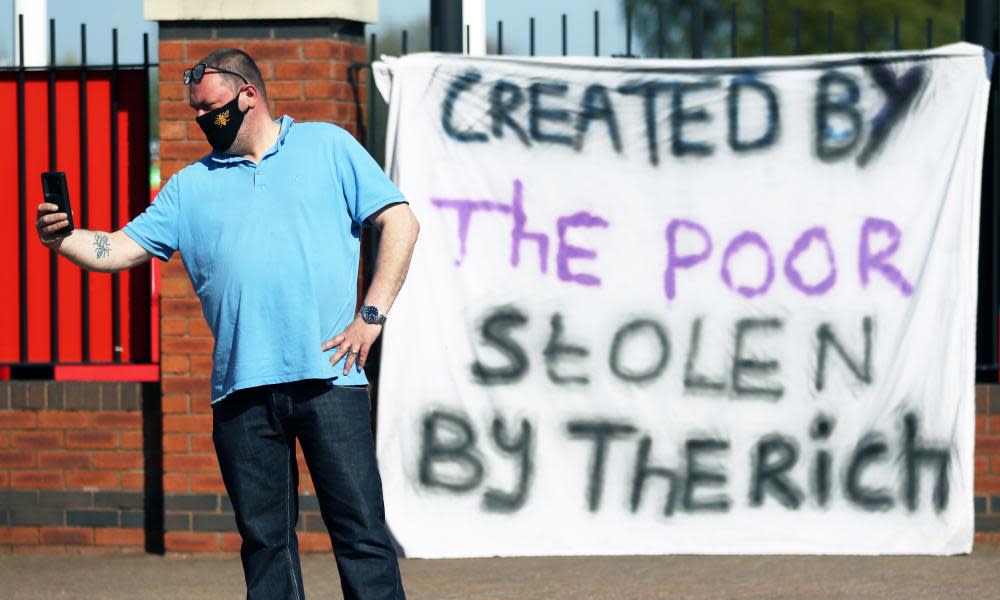JP Morgan CEO’s words on community and fairness don’t square with backing ESL

It’s a good thing JP Morgan hasn’t yet launched its retail bank in the UK. If it had, calls for a boycott would probably be heard already on account of the Wall Street bank’s role as financier, and thus enabler, of the deeply unpopular breakaway Super League for European football.
Related: Government pledges to stop English clubs joining European Super League
It probably had to be a big American bank as the centre of the venture since the rumoured numbers – debt finance of up to €4bn – are enormous. But having a tin ear is also a useful qualification and JP Morgan certainly has that.
It is only a fortnight since the chief executive, Jamie Dimon, was warbling at length about his bank’s sense of purpose. “When JP Morgan Chase enters a community, we take great pride in being a responsible citizen at the local level – just like the local bakery,” he claimed in his annual letter to shareholders. It is hard to spot any sense of localism or community in the backing of an exercise in short-term greed that is grubby even by modern football’s standards.
Nor can one see how Dimon squares his support for a closed shop cartel with his claimed belief that society is better “when everyone has a fair shot at participating – and sharing – in the rewards of growth”. Leicester City, among others, may think the dots don’t join. Perhaps Sajid Javid, the former chancellor, will be able to explain. He, remember, somehow combines his role as an MP with that of adviser to JP Morgan on European business matters.
Of course, nobody should be remotely surprised by the gulf between Dimon’s cuddly words and JP Morgan’s on-the-ground version of serving the community. The clients pay the bills and the share prices of the quoted-company clubs – Juventus and Manchester United – rose strongly on Monday. But, please, spare us Dimon’s homilies in future.
Plugging of GKN pension deficit shows another side of Melrose
The Melrose crew are clearly still sensitive about their reputation for being rapacious private equity buccaneers dressed in public-company clothes, an image that did not help during the ultimately successful £8bn takeover bid for GKN in 2018.
Monday’s $3.6bn disposal of the bulk of air-conditioning group Nortek on typically good terms (just not as good as the market had hoped) was accompanied by an untypical sermon from chief executive Simon Peckham on the joys of serving many stakeholders.
“We are continuing to show that it is possible to make great returns for shareholders, while looking after pensioners and answering the environmental demands of the modern world,” he said.
He’s laying it on thick since the environmental boast rests on Nortek’s push into technology that reduces water and energy consumption in the cooling of datacentres, which sounds the type of investment that could be driven by purely commercial imperatives.
But on the pension aspect, he makes a valid point. About £100m of the disposal proceeds are being directed to the GKN pension fund, which showed a funding deficit of £1bn at the time of acquisition. Three years later, the figure is now down to £200m and there’s a surplus on an accounting basis. It is hard to believe a standalone GKN would have made the same progress without selling a chunk of its operations.
None of which is to pretend that Melrose is led by virtuous social workers. They pay themselves splendidly when the numbers stack up – £42m a head for the top quartet in 2018. But, equally, the asset-stripping caricature has never been quite correct. Yes, the private equity-style “buy, improve, sell” mantra often involves factory closures, but Melrose has also plugged a few pension deficits over the years. So it should, but that feature of the model is often overlooked.
‘Britcoin’ would just be an alternative payment system
In the age of bitcoin, it’s probably obligatory for a central bank to take a look at setting up its own digital currency. And, in the case of the Bank of England, there’s an easy shorthand for the project – Britcoin.
Related: Rishi Sunak launches taskforce on Bank of England digital currency
But it’s already clear that any new Britcoin would be tied penny-for-penny to the value of sterling. So it wouldn’t be an alternative currency in any meaningful sense – just a different, and probably faster, type of payments system.
One can call it cutting-edge innovation if one wishes – and, note, it was another day when the chancellor, Rishi Sunak, was shouting about the UK’s ambitions in fintech, or financial technology. But, at heart, the adventure sounds mundane.

 Yahoo Movies
Yahoo Movies 
